|
|
|
Sort Order |
|
|
|
Items / Page
|
|
|
|
|
|
|
| Srl | Item |
| 1 |
ID:
165050
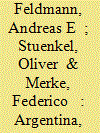

|
|
|
|
|
| Summary/Abstract |
This article examines the role of Argentina, Brazil and Chile (the ‘ABC countries’) in supporting democracy through the logic of consequences and appropriateness in three emblematic cases: the removal of President Zelaya in Honduras in 2009, the constitutional crisis that led to the removal of President Fernando Lugo in Paraguay 2012 and the sudden closing of the National Assembly in Venezuela in 2017. The authors argue that the ABC governments’ responses to governance crises have been shaped by a mixture of motivations, both instrumental (geopolitical interest or ideological affinity) and ideational (a normative preference for democracy). This mixture has resulted in inconsistent policies deriving from the mismatch between the normative commitments made by these countries, enshrined in multilateral instruments such as democracy clauses, which have often limited their room for manoeuvre, and their preference for a measured, prudent foreign policy based upon traditional principles of non-intervention. Specifically, the authors find that the ABC countries’ stance on democracy support depends on two fundamental conditions: their leverage vis-à-vis the target state and the degree of certainty regarding a potential resolution of a given democratic crisis.
|
|
|
|
|
|
|
|
|
|
|
|
|
|
|
|
| 2 |
ID:
163454
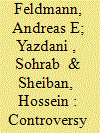

|
|
|
|
|
| Summary/Abstract |
The Iranian constitutional revolution of 1906–09 paved the way for the establishment of new administrative institutions, adopting modern ideas and the hegemony of new political discourse over the archaic political reasoning. One of the most important aspects of the new discourse was the definition and internalization of modern concepts. This paper holds the view that the concept ‘freedom’ brought about a complicated problem for the socio-political sphere in the course of the Iranian revolution and, as such, deserves a thorough examination. Previous studies on the subject have usually neglected this aspect. Yet, this was exactly the main domain of the clash between traditionalism and modernity during the revolutionary years and brought about far-reaching results for Iranian society. This article attempts to contribute to this field by examining a number of Iranian journals of the period in order to evaluate their understanding of the concept ‘freedom’ and show the discrepancy between the constitutionalist and non-constitutionalist discourses.
|
|
|
|
|
|
|
|
|
|
|
|
|
|
|
|
| 3 |
ID:
164585
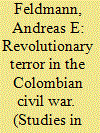

|
|
|
|
|
| Summary/Abstract |
This article investigates the use of terror in Colombia's civil war by examining the behavior of the Revolutionary Armed Forces of Colombia (FARC) and the National Liberation Army (ELN). Relying on an extensive database covering 25 years of conflict, the article traces the way in which the FARC and ELN have employed terror as part of their overall insurrectional strategy. I argue that, while ideology plays an important role in inspiring revolutionary terrorism, these groups' terror practices evolved over time and were driven principally by military strategies. Changing conditions in the theater of war, particularly growing competition with paramilitary forces, in turn, influenced these strategies. The article also discusses some interesting differences between the two groups' terror practices.
|
|
|
|
|
|
|
|
|
|
|
|
|
|
|
|
| 4 |
ID:
137077
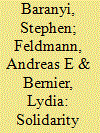

|
|
|
|
|
| Summary/Abstract |
The growing influence of the global South in international affairs has prompted a passionate discussion about the role of South–South cooperation (SSC). SSC is sometimes uncritically portrayed as a uniform phenomenon that presents a superior alternative to North–South Cooperation (NSC). To problematise and deepen our knowledge about SSC, this article examines the intriguing case of Haiti, which has seen a wealth of SSC cooperation since the international intervention in 2004. Drawing on extensive fieldwork, the study compares the approaches of two distinct Southern groupings working in Haiti: Argentina, Brazil and Chile (the so-called ABC countries) and the Bolivarian Alliance for the Americas (ALBA) led by Venezuela. We argue that ABC and ALBA display marked differences and that, while their approaches have distinct strengths and weaknesses, they do not necessarily represent a fundamental improvement over NSC.
|
|
|
|
|
|
|
|
|
|
|
|
|
|
|
|
| 5 |
ID:
087353
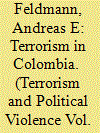

|
|
|
|
|
| Publication |
2009.
|
| Summary/Abstract |
This article examines contemporary uses of terrorism in Colombia. Combining an historical analysis with the most complete database available on political violence, we illustrate how terrorism in Colombia constitutes a specific strategy that can be distinguished from other manifestations of violence. We argue that Colombia's non-state armed groups have turned terrorism into a pivotal element of their repertoires of action. These parties have not only increased their reliance on this strategy and introduced more refined forms such as de-territorialized terrorism, but also have specialized in particular terrorist attacks that suit their general objectives. While paramilitary groups rely mostly on massacres and forced disappearance, guerrillas concentrate on agitational terrorism including kidnappings and indiscriminate bombings.
|
|
|
|
|
|
|
|
|
|
|
|
|
|
|
|
|
|
|
|
|